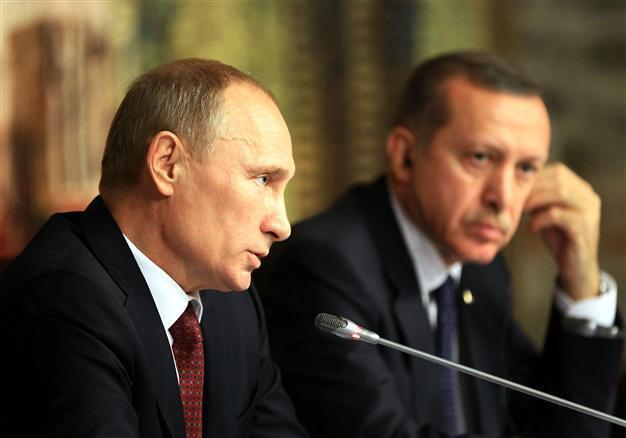Russia, Turkey discuss new ideas on Syria: Kremlin
ASHGABAT - Reuters

AA Photo
Russian and Turkish diplomats will soon start working on new ideas for ending the conflict in Syria which emerged in talks between President Vladimir Putin and Prime Minister Tayyip Erdogan, the Kremlin said on Wednesday.Putin and Erdogan agreed to differ on Syria at Monday's talks in Istanbul but Russia has distanced itself from President Bashar al-Assad and tried to position itself for his potential exit from power.
Putin's spokesman, Dmitry Peskov, confirmed diplomats would discuss what Putin said were "some new, fresh ideas" but gave no details.
"It was agreed that these ideas will be discussed in more detail by our diplomats in the very near future, in order to understand how viable they are and how great their potential to resolve (the Syrian crisis)," Peskov said.
"It is still unclear to what degree they might be acceptable to the sides in Syria itself," he told reporters on the sidelines of a summit of the post-Soviet Commonwealth of Independent States in Turkmenistan's capital, Ashgabat.
Russia has shielded Assad by blocking, along with China, three U.N. Security Council resolutions aimed at pushing him out or pressing him to end violence that has killed more than 40,000 people since a crackdown on protests began in March 2011.
Turkey - worried about Syria's chemical weapons, a growing refugee crisis, and Syrian support for Kurdish militants - has backed the Syrian opposition and led calls for international action against Assad.
After talks with Erdogan, Putin said Russia and Turkey still disagreed about how to end the crisis in Syria.
Russian officials have repeatedly said Moscow is not insisting Assad remain in power, but that his fate must not be decided by foreign governments or other external forces, including the U.N. Security Council.
"The exit or the continuation of the Assad regime is absolutely not a must," Peskov said.
"But we cannot say, sitting in Ankara or London or Qatar, that Assad must go. That cannot be, it is not viable - such decisions could potentially lead to a worsening of the situation," he said.
Putin, who returned to the presidency in May, has made Syria a showcase of what he says is the determination to protect the principle of non-intervention in sovereign states.
Russia has warned the West it would not allow a repeat in Syria of last year's events in Libya, where NATO military intervention helped rebels to topple dictator Muammar Gaddafi.
But the talk of considering fresh ideas suggested Russia is looking for ways to end the diplomatic deadlock or at least cast itself as part of a solution, and position itself for the possibility of Assad's exit.
"Russians are now looking beyond Assad," said Dmitry Trenin, director of the Carnegie Moscow Center think-tank.
"I don't think they will change their position on the basic issues such as 'regime change' or outside intervention but I think they will be looking at the day after, what happens when the government falls," he said.
Putin's Middle East affairs envoy, Mikhail Bogdanov, met the U.S. ambassador to Moscow at the request of the United States on Tuesday and the British ambassador on Wednesday, Russian's Foreign Ministry said. The focus was on Syria and the Israeli-Palestinian situation but details were not announced.
Russia has stepped up meetings with Syrian opposition groups, seemingly hedging its bets.
"I would not rule out that behind the scenes, (Russia) could be trying to find a way to solve 'the Assad problem'," a Western diplomat said.
That could be easier said than done.
"Russia's influence over Assad has been widely exaggerated," Trenin said. "The Russians have very unfortunately manoeuvred themselves into a situation in which they are considered to be responsible for Assad without any real influence over him."
















